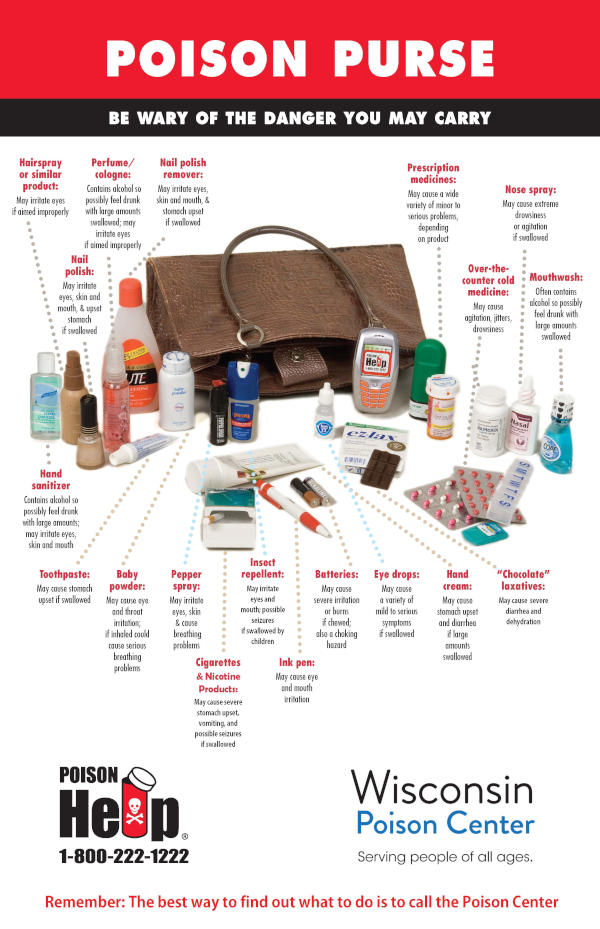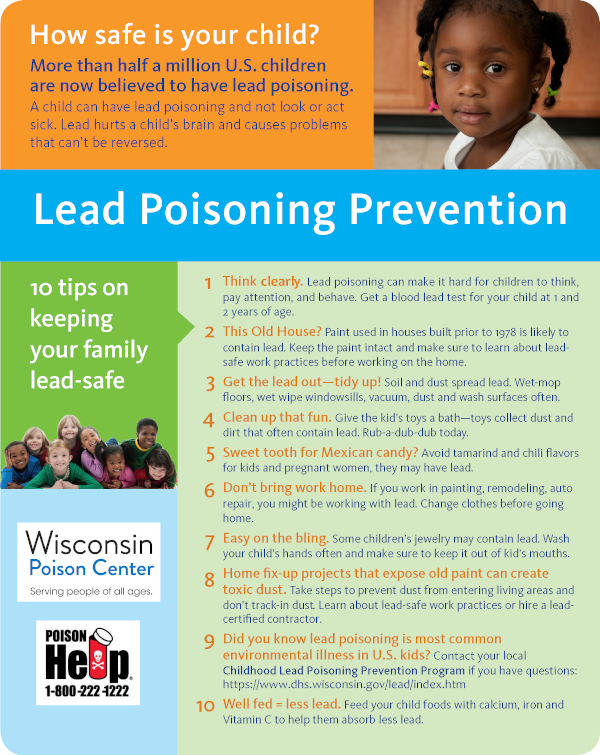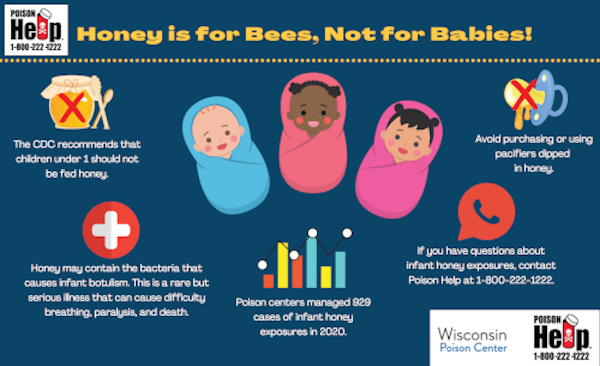Wisconsin Poison Center Info
For poison questions call 1-800-222-1222 or visit https://www.wisconsinpoison.org/ for more information.
January 2022 News You can Use

Weather or Not... Poison Centers Always Open
Our nurses, pharmacists and doctors are always here ready to help you quickly and for free. Calling your poison center may save you a trip to the doctor or hospital
Flashlights: In case of a power outage, use a flashlight to check medicine labels, cleaners and other products before use.
Original Containers: Keep antifreeze, snow salt or ice melt, and other chemicals in their original containers and away from children and animals.
Carbon Monoxide: Install carbon monoxide alarms on every floor of your home. Carbon monoxide is found in fumes when you burn fuel in cars, generators, stoves, furnaces and more
Refrigerator: When the power is out, keep the refrigerator and freezer doors closed to maintain cold temperature. Throw out perishable food if the power has been out for 4 hours or more.
How safe is your child? Lead Poisoning Prevention

Honey is for Bees, Not for Babies!

Carbon Monoxide
CO poisoning is a leading cause of accidental poisoning death in the United States from inhalation. CO is a poisonous gas. It has no color, odor, or taste. All fuel-burning devices make CO. The devices can produce dangerous levels when not operating properly.
Sources
- Gas furnaces and stoves
- Water heaters
- Kerosene/propane space heaters
- Wood burning and gas fireplaces
- Power generators
- Car engines
Signs of CO Poisoning
- Headache
- Nausea
- Drowsiness
- Confusion
- Chest pain
- Seizures
- Coma
- Pregnant women and people with history of stroke or heart disease are more at risk for CO poisoning
Prevention
- Never leave a car running in a closed garage
- Have all fuel-burning devices, furnace, and fireplaces, checked out by an expert at the start of each winter
- Have CO detectors in your home
- Replace CO detectors every 5-7 years
Windshield Washer Fluid
This product can cause severe toxicity even if only swallowed in small amounts.
- One of the main active ingredients of windshield washer fluid is methanol
- Most windshield washer fluids contain at least 50% methanol
- One accidental swallow of this substance by a child or adult could result in serious medical complications like blindness or death
This colorful liquid is used by the gallon and can be found in almost every car or garage in Wisconsin.
- Windshield washer fluid is most commonly available in 1 gallon jugs and comes in attractive colors including: blue, orange, red, purple, and most recently green
- Children can easily mistake this product for juice or Kool-Aid
Although this product does come packaged with a "Child Resistant Cap", many young children left alone with this product for more than a few minutes can open this safety mechanism. Many adults put this product into other containers such as empty Gatorade bottles or empty soda cans, resulting in a potentially life threatening ingestion to an unsuspecting party mistaking it for the original product.
Prevention
- Keep this product in its original container
- Make sure it is stored either in the trunk of a vehicle or in a locked cabinet in the garage
Holiday Plants
Holiday plants are ideal for gift giving. Are you considering giving a seasonal plant to a family with small children? Look up the plant name to find out if it’s poisonous before giving it as a gift. Call the Wisconsin Poison Center at 1-800-222-1222 and get the information you need to help prevent plant poisonings.
Poinsettia
- When eaten in large amounts this plant may cause stomach irritation, nausea, vomiting or diarrhea, but not considered to be highly poisonous.
- The milky sap may cause skin irritation- itch or burning, especially for those with latex allergies.
Bittersweet
- All parts of the plant are poisonous.
- The highest amounts of toxin are found in the unripened (green) berries.
- The poison in this plant may cause a decrease in heart rate, drowsiness and headaches.
Pines
- Eating any part of the Yew plant (pictured) can cause seizures and coma. If someone eats any part of this plant, call the Poison Center for more information.
- Small amounts of pine sap may cause skin irritation in sensitive individuals, stomach upset, or vomiting.
- The sharp needles of some pine trees can cause physical damage to throat or stomach.
- Pine cones are not to be eaten and are non-toxic.
Boxwood
- Found in wreaths and roping
- Twigs and leaves contain a substance that can cause severe vomiting and bloody diarrhea. If these symptoms occur, call the Poison Center for more information.
Suggested Nontoxic Plants - African Violet, Christmas Cactus, Spiderwort, Jade or Boston Fern. For more information of non-toxic plants click on the following link: Brochure Toxic Plant List.PDF
The Wisconsin Poison Center is here to help answer any questions you may have about poisons and poisonous plants 24/7/365.



